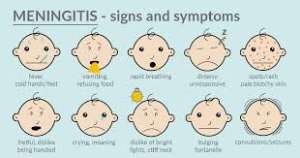
What Causes Meningitis in Children?
Bacteria and viruses cause the great majority of meningitis disease in infants and children. The most serious occurrences of meningitis are caused by bacteria; viral-caused meningitis is common but usually is less severe and, except for the very rare instance of rabies infection, almost never lethal. However, both bacterial and viral types of the disease are contagious .
Meningitis normally occurs as a complication from an infection in the bloodstream. A barrier (called the blood-brain barrier) normally protects the brain from contamination by the blood. Sometimes, infections directly decrease the protective ability of the blood-brain barrier. Other times, infections release substances that decrease this protective ability.
Once the blood-brain barrier becomes leaky, a chain of reactions can occur. Infectious organisms can invade the fluid surrounding the brain. The body tries to fight the infection by increasing the number of white blood cells (normally a helpful immune system response), but this can lead to increased inflammation. As the inflammation increases, brain tissue can start swelling and blood flow to vital areas of the brain can decrease due to extra pressure on the blood vessels.
Meningitis can also be caused by the direct spread of a nearby severe infection, such as an ear infection ( otitis media ) or a nasal sinus infection ( sinusitis ). An infection can also occur any time following direct trauma to the head or after any type of head surgery. Usually, the infections that cause the most problems are due to bacterial infections .
- Bacterial meningitis can be caused by many different types of bacteria. Certain age groups are predisposed to infections of specific types of bacteria.
- Immediately after birth, bacteria called group B Streptococcus, Escherichia coli, and Listeria species are the most common.
- After approximately 1 month of age, bacteria called Streptococcus pneumoniae, Haemophilus influenzaetype B (Hib), and Neisseria meningitidis are more frequent. The widespread use of the Hib vaccine as a routine childhood immunization has dramatically decreased the frequency of meningitis caused by Hib.
Viral meningitis is much less serious than bacterial meningitis and frequently remains undiagnosed because its symptoms are similar to the common flu . The frequency of viral meningitis increases slightly in the summer months because of greater exposure to the most common viral agents, called enteroviruses.
Other more rare causes of meningitis that are noninfectious are cancers, head injury , brain surgery, lupus , and some drugs. There is no person-to-person transmission from these relatively rare causes.




 E-Cedi will be used as a weapon to fight money laundering and corruption — Bawum...
E-Cedi will be used as a weapon to fight money laundering and corruption — Bawum...
 Election 20204: Transfer power to us peacefully for your own good — NDC tells NP...
Election 20204: Transfer power to us peacefully for your own good — NDC tells NP...
 Voter registration: Don't bus minors to registration centres — Nana Akomea warn ...
Voter registration: Don't bus minors to registration centres — Nana Akomea warn ...
 Error in registration slip: Trust the Commission on its mandate — EC assure Ghan...
Error in registration slip: Trust the Commission on its mandate — EC assure Ghan...
 Ejisu by-election: NPP aspirant who projected less than 5% votes for Aduomi cong...
Ejisu by-election: NPP aspirant who projected less than 5% votes for Aduomi cong...
 Election 2024: Stolen BVR kits could be used to illegally register people – NDC ...
Election 2024: Stolen BVR kits could be used to illegally register people – NDC ...
 60% of SHSs taken off double track system – Dr Yaw Osei Adutwum
60% of SHSs taken off double track system – Dr Yaw Osei Adutwum
 Voter registration: We hope to hit over one million registered voters in Volta -...
Voter registration: We hope to hit over one million registered voters in Volta -...
 Akufo-Addo not obliged to disclose full KPMG audit report – Presidency
Akufo-Addo not obliged to disclose full KPMG audit report – Presidency
 ECG staff used ransomware to sabotage paperless system, can you imagine they eve...
ECG staff used ransomware to sabotage paperless system, can you imagine they eve...
